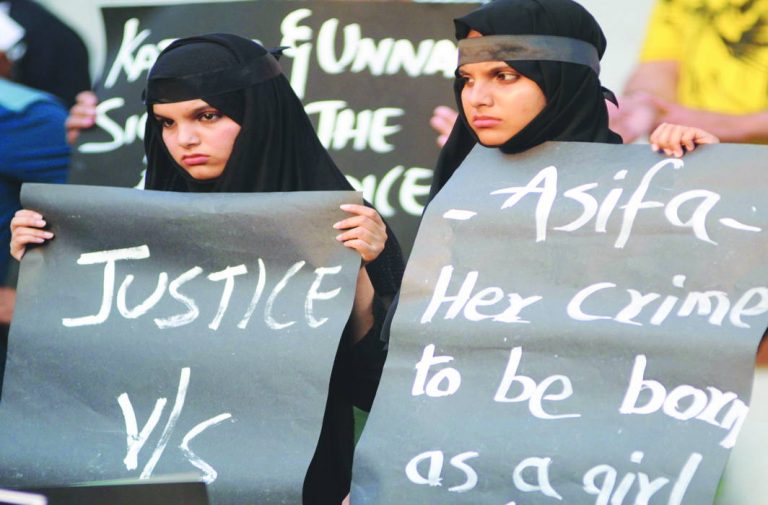
As experience has shown that child rapists are often free of remorse for their heinous act, will the death penalty serve any purpose?
~By Abhishek Dixit
Sexual abuse of children happens in towns, cities and villages, across castes and sects, and even in households. Recent National Crime Records Bureau findings also reveal high incidence of workplace sexual harassment of children.
India’s restrictions on sex education have enabled incidents of abuse to remain hidden. With the ban on sex education in many states and regressive attitudes in India, children do not have the language to describe what is done to them. Further, they also lack the basic understanding of “good touch, bad touch”, which is the building block of a healthy physical identity.
A 2007 survey by the ministry of women and child development saw over half of all Indian children under 18 report sexual abuse, 25 percent of the time by someone they knew. With the high incidence of child abuse, the use of the Protection of Children against Sexual Offences Act, 2012 (POCSO), a law formulated to empower both the child and responders, has been a boon. It was established to protect children against offences like sexual abuse, sexual harassment and pornography. It was formed to provide a child-friendly system for trial under which the perpetrators could be punished. It also makes provisions for avoiding the re-victimisation of the child at the hands of the judicial system.
And recently, the Union cabinet cleared an ordinance on the POCSO Act whereby the death penalty will be given to those convicted of raping a child upto 12 years of age. The centre has cleared the criminal law amendment ordinance and the POCSO Act is a part of this amendment. The death penalty to child rapists took centrestage after two separate cases of child rape—in J&K’s Kathua and UP’s Unnao—leading to massive outrage. The centre has increased minimum punishment in case of rape of women from seven years to 10, extendable to life imprisonment. It said that in case of gangrape of a girl aged below 12 years, punishment will be life imprisonment or the death sentence.
“Ordinance may prove counterproductive”
Top opinion-makers in the legal fraternity share their views on the ordinance on the India Legal Show:
Though Section 376 is very stringent, it did not result in as many convictions as it should have, and so the POCSO Act came along. But these crimes are a result of a kind of mental illness. It is not a problem that the law alone can solve. Traditions and family play a big role in regulating the behaviour of young people and sustaining morality within a community.
—Justice RB Mishra, former judge, Allahabad High Court
The intentions behind framing this law are good. Some provisions, though, are rather harsh and unnecessary. For instance, there is no anticipatory bail for the accused. This is grossly unjust and violative of his right under Article 21. Our experience with POCSO shows that over 50 percent of the cases registered under it are false. Also, the minimum punishment under the new law is stipulated to be 20 years. I personally think seven-10 years would be okay. But in cases where brutality is committed, the death penalty is justified.
—Vivek Sood, senior advocate
My first impression of this ordinance is that it may be counter-productive. My intuition is that it will not serve its purpose. This ordinance will not be beneficial for children who are victims of sexual abuse and rape.
—Justice V Gopala Gowda, retired judge, Supreme Court
But there are points of concern:
- Even parents of minor victims are raising their voices against meting out the death penalty to child rapists, saying it could lead to victims being killed by perpetrators. Instead, they want strengthening of the judicial mechanism to support the victims.
- Experience with many hardcore criminals lodged in various prisons shows that capital punishment alone may not be a big deterrent.
- Prisoners convicted for murder charges have a different mindset. Brainwashed terrorists have always justified their crimes. Notorious criminals have taken to criminal activities as a profession and don’t have any guilt for their acts. Only those who have committed an offence due to sudden provocation or circumstances have regretted their act.
- There certainly is a need to conduct psychological research on criminal behaviour and a scientific study on the background of such criminals. Psychoanalysis seems necessary before taking any major steps. It should not appear as a consequence of public demand for stringent punishment of the rapists of minors.
- How about granting welfare to rape victims and dealing with issues relating to educating and sensitising the youth about sexual offences against women, especially minors?
- All heinous crimes have a psychological background. Paedophilia is a psychiatric disorder. Most of the offenders are relatives or neighbours of the victims. Hence, it is more difficult for children to disclose the sexual abuse. How, then, to address this issue?
Certainly, child rape is a most heinous and detestable crime. Hence, capital punishment seems justified. But will the death penalty act as a deterrent. Only time will tell.
—The writer is Commandant, Tamil Nadu Special Police, Tihar Jail

